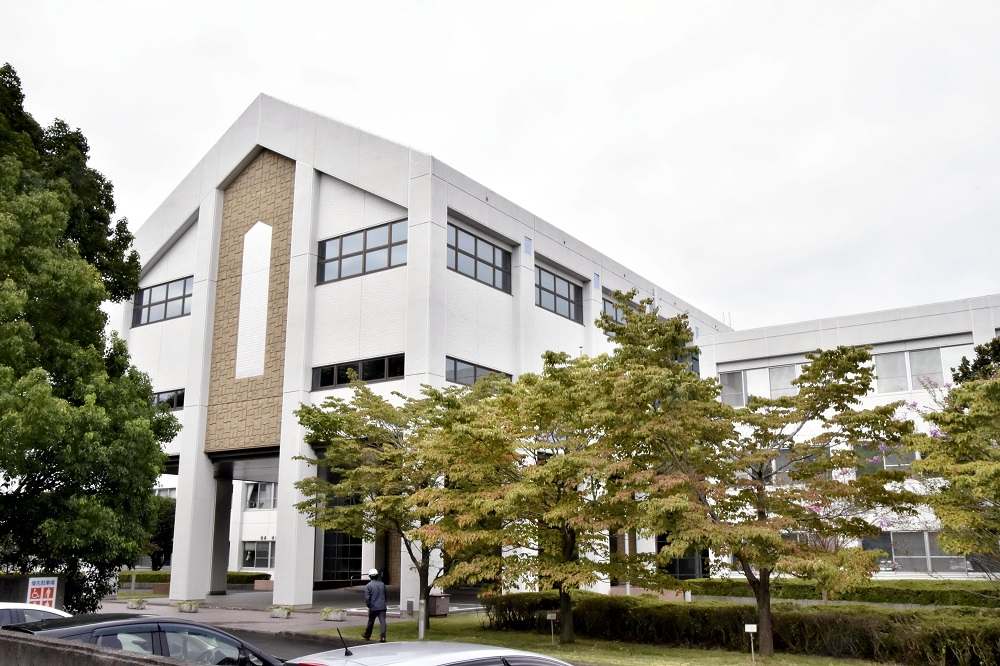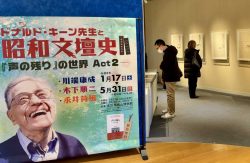
The House of Representatives passes a bill to revise the Immigration Control and Refugee Recognition Law on May 9.
20:53 JST, May 23, 2023
For the time being, Afshin has some of the peace of mind he had been seeking for decades. But there is no guarantee how long it will last.
“For this visa, I had to endure so much pain,” he said.
Afshin, 56, fled to Japan in 1990 to avoid persecution in his homeland of Iran for engaging in opposition activities. But in a country with a notoriously low rate of accepting refugees, he has constantly been turned down in his bid for refugee status.
In April, after he was denied for a fourth time, the government finally granted him a special, one-year renewable visa, citing his poor health.
While that alleviates — for now — the nagging fear of being deported at any time that has haunted Afshin for decades, and which came agonizingly close to reality at one point, the situation might get worse for people like him under a bill making its way through the Diet.
The bill, submitted by the Justice Ministry to the current Diet session, revises the Immigration Control and Refugee Recognition Law to eliminate a loophole that has allowed delays in the deportation process.
Under the current law, the deportation process is suspended while an asylum application is being processed, no matter how many times the person had been previously rejected. The revision will allow for deportation procedures to resume after two failures and while a third application is being processed.
The House of Representatives passed the bill on May 9, and it is currently being deliberated in the House of Councillors.
The ministry argues that the change is necessary because people have been abusing the law to avoid deportation, causing a logjam in the system overall. The ministry has said that setting a limit will help its efforts to promptly and reliably offer asylum to genuine refugees.
However, experts have said that Japan’s refugee recognition system has a fundamental problem of being too strict, denying too many people who should be protected as refugees.
Shirking obligation
According to the United Nations High Commissioner for Refugees, the number of people forced to flee their country due to persecution, conflict, violence or other factors was 89.3 million by the end of 2021, more than double the 42.7 million at the end of 2012.
Among the Group of Seven advanced economies, Germany granted asylum to 39,000 individuals in 2021 — the highest number — followed by Canada with 34,000. Italy was sixth with 7,000.
Far, far behind was Japan, which allowed in just 74 refugees in 2021, according to the Immigration Services Agency, a Justice Ministry external bureau in charge of the asylum system.
“Japan remains a country which receives very few refugees,” U.N. High Commissioner for Refugees Filippo Grandi said at a press conference at Japan National Press Club in Tokyo in November last year. “Much more must be done in my opinion for Japan to become a truly welcoming country for refugees.”
Japan as a country has a legal obligation to offer protection to refugees as it became a signatory to the Convention Relating to the Status of Refugees in 1981. The convention defines refugees as those with a “well-founded fear of being persecuted for reasons of race, religion, nationality, membership in a particular social group, or political opinion” in their countries of origin.
Afshin’s case clearly fits into the category of “political opinion,” according to his lawyer Makoto Iwai. “He could be persecuted if deported to Iran,” Iwai said.
Fleeing persecution
Afshin, who asked to use a pseudonym, joined the Mujahedeen-e-Khalq (MEK) in 1979, the year the political-militant group helped overthrow the Shah during the Islamic Revolution.
The new regime under the conservative Islamic clergy gradually suppressed the MEK. Afshin circulated opposition treatises and distributed cassette tapes of MEK speeches.
The authorities repeatedly targeted Afshin for beatings, and on two separate occasions he found himself threatened at gunpoint. His girlfriend, whom he had invited to join the MEK and was two years younger, was arrested and executed when she was around 16.
“There was nothing left that I could do,” Afshin said. “If I were arrested I could have been executed a few days later.”
Afshin fled to Japan in 1990 on short-stay status. Around that time, there was a labor shortage particularly for jobs regarded as dangerous or unsanitary.
He did not apply for refugee status right away. “I could easily find a construction job and establish a life here, so I did not see the point of going through the paper work for asylum,” he said, adding, “I and other foreigners were doing work that the ordinary Japanese did not want to do.”
In the 1990s, the Japanese economy plunged into a recession and the work environment worsened. Public sentiment against illegal foreign workers swelled and the government began to crack down on those overstaying their visas.
Afshin was arrested and convicted of overstaying his visa in 2001. The next year, he applied for refugee status for the first time, but it was denied the following year.
In the asylum process, Afshin was interviewed by an immigration official. He provided details about his involvement in the MEK and the oppression by the government, but failed to convince the official.
According to Iwai, an applicant’s chances improve if they are already known to authorities in their home country, such as being a well-known dissident. “It is difficult for an applicant to become known to authorities without first being detained or arrested, which for practical purposes, is a harsh hurdle to get over.”
There is one question that Afshin says he still vividly remembers from the interview. When he told the official of being threatened at gunpoint, he said the official asked him, “Do you have a photo?”
“While in danger of getting killed, I was fighting for my beliefs,” Afshin said. “There was no way I could take a picture.”
An official at the Immigration Services Agency told The Japan News it is unlikely that an official would ask such a question.
However, Koichi Kodama, another lawyer who has assisted asylum seekers, said, “Many agency officials lack the ability to understand the circumstances of each applicant and the relevant facts.”
Kodama said that in the case of one Afghan asylum seeker, an official did not recognize the name of “[Hamid] Karzai,” the former president of Afghanistan.

The Immigration Services Agency’s detention facility in Ushiku, Ibaraki Prefecture
A close call
As he was repeatedly applying for asylum, Afshin was held in a detention center three times, spending a total of about four years in lockup. During that time, he had a harrowing close call with being sent back to Iran.
In principle, those denied a request for asylum are held in a detention center until their deportation order is enforced. The authorities have the power to temporarily grant a release due to poor health or other circumstances.
On Feb. 2, 2006, Afshin was being held at a detention facility in Ushiku, Ibaraki Prefecture, when a group of officials tried to remove him from his room by force. Knowing that deportation means the death penalty, Afshin said he purposely banged his head against the window frame. “There was no option other than hurting myself,” he said.
Covered in blood, he was given first aid and put on a bus to Narita Airport. But upon arrival, he resisted when officials tried to take him off the bus, causing his wounds to reopen and blood to flow again. At the terminal, an apparent Iran Air staff member saw that Afshin was bleeding and refused to allow him onto the flight to Iran. He was returned to the detention facility.
The close call left Afshin in a despondent state, and he was diagnosed as suffering from post-traumatic stress disorder. “I lived in fear of being deported every single day from morning to night.”
In addition, he had a heart condition, which necessitated heart surgery in March this year.
The special visa that Afshin received in April, Designated Activities Visa, allows him to stay in the country but prohibits him from working. He relies on donations from individuals and organizations to survive.
Afshin occasionally joins protests against the revision bill held near the Diet building in Tokyo.
“The government should review the system to give more protection to refugees,” Afshin said. “Otherwise, it should withdraw from the refugee convention so that people who seek protection in Japan by being recognized as a refugee do not have to suffer as I have.”
Top Articles in JN Specialities
-

Tokyo University of the Arts Now Offering Free Guided Tour of New Storage Building, Completed in 2024
-

Exhibition Shows Keene’s Interactions with Showa-Era Writers in Tokyo, Features Newspaper Columns, Related Materials
-

Step Back in Time at Historical Estate Renovated into a Commercial Complex in Tokyo
-

The Japan News / Weekly Edition (1/30-2/5)
-

Prevent Accidents When Removing Snow from Roofs; Always Use Proper Gear and Follow Safety Precautions
JN ACCESS RANKING
-

Japan PM Takaichi’s Cabinet Resigns en Masse
-

Japan Institute to Use Domestic Commercial Optical Lattice Clock to Set Japan Standard Time
-

Israeli Ambassador to Japan Speaks about Japan’s Role in the Reconstruction of Gaza
-

Man Infected with Measles Reportedly Dined at Restaurant in Tokyo Station
-

Videos Plagiarized, Reposted with False Subtitles Claiming ‘Ryukyu Belongs to China’; Anti-China False Information Also Posted in Japan























